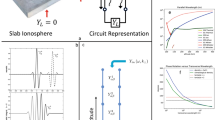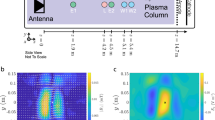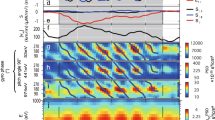Abstract
THE phenomenon of reflection of radio waves from the ionosphere and the observed echo patterns has received satisfactory explanation from the magneto-ionic theory, first put forward by Appleton1.
This is a preview of subscription content, access via your institution
Access options
Subscribe to this journal
Receive 51 print issues and online access
$199.00 per year
only $3.90 per issue
Buy this article
- Purchase on Springer Link
- Instant access to full article PDF
Prices may be subject to local taxes which are calculated during checkout
Similar content being viewed by others
References
E. V. Appleton, U.R.S.I. papers (Washington, 1927). Appleton and Builder, Proc. Phys. Soc. Lond., 45, 208; 1933.
Proc. Phys. Soc. Lond., 45, 261; 1933.
G. R. Toshniwal and B. D. Pant, NATURE, 133, 947; 1934.
G. R. Toshniwal and B. D. Pant, see appendix of a paper read before the first meeting of the National Institute of Sciences on Jan. 8, 1935 (in the press).
R. R. Bajpai, Thesis for M.Sc. Examination. T. D. Bausal, Thesis for M.Sc. Examination.
Author information
Authors and Affiliations
Rights and permissions
About this article
Cite this article
TOSHNIWAL, G. Three-fold Magneto-ionic Splitting of the Radio Echoes reflected from the Ionosphere. Nature 135, 471–472 (1935). https://doi.org/10.1038/135471b0
Issue Date:
DOI: https://doi.org/10.1038/135471b0
This article is cited by
-
Magneto ionic triple splitting of ionospheric waves
Proceedings of the Indian Academy of Sciences - Section A (1950)
-
Triple Magneto Ionic Splitting of Rays Reflected from the F2 Region
Nature (1948)
-
Conditions of Escape of Radio-frequency Energy from the Sun and the Stars
Nature (1946)
-
Reflection from the Ionosphere
Nature (1937)
Comments
By submitting a comment you agree to abide by our Terms and Community Guidelines. If you find something abusive or that does not comply with our terms or guidelines please flag it as inappropriate.



